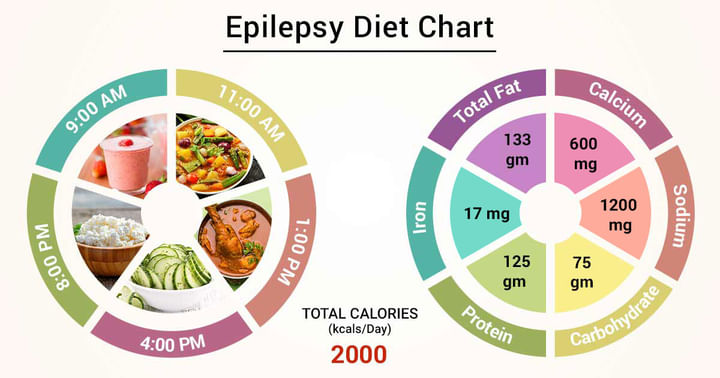Diet Chart For epilepsy
Last Updated: Jan 20, 2025
About
Epilepsy is a neurological disorder characterized by recurrent seizures symptoms. These seizures occur because of a sudden surge of electrical activity in the brain which causes a temporary disturbance in the messaging systems of the brain cells. These seizures have a range of severity depending on the individual. Convulsion with no fever, intermittent fainting spells, during which bowel or bladder control is lost, which is frequently followed by extreme tiredness, stiffness etc., are a few other symptoms of epilepsy.
The cause of Epilepsy is unknown in most cases, although here a few factors, which may result in Epilepsy. Inherited genetic traits, head injury (for example due to car accident), brain conditions including strokes or tumors, infectious diseases etc.
Accordingly, there are three descriptions of seizures depending on where the activity started in the brain. These are- Partial Seizure, Generalized Seizure and Secondary Generalized Seizure. These are broad categorization of the type of seizures and include sub-divisions of the same.
Epilepsy diet works on reducing the number of seizures. In a few cases, the diet also helps in making the person seizure-free.
Diet Chart
| Sunday | |
| Breakfast (8:00-8:30AM) | 1 cup strawberry smoothie + 1 cup cottage cheese + 5-6 tofu pakora |
| Mid-Meal (11:00-11:30AM) | 1 cup black beans soup + 1 cup sauteed vegetables (mushrooms, spinach, capsicum- with butter and olive oil) |
| Lunch (2:00-2:30PM) | 1 plate chicken salad with veggies (chicken breast) (onion, tomato, capsicum, mushrooms) |
| Evening (4:00-4:30PM) | 1 sliced cucumber |
| Dinner (8:00-8:30PM) | 1 cup creamy spinach soup with cottage cheese |
| Monday | |
| Breakfast (8:00-8:30AM) | 1 cup blackberry smoothie + 1 cup soybean salad + 1 cup grilled cottage cheese |
| Mid-Meal (11:00-11:30AM) | 1 cup vegetable poha |
| Lunch (2:00-2:30PM) | 1 cup black chana salad (cucumber, tomato, spinach) |
| Evening (4:00-4:30PM) | 1 cup vegetable upma |
| Dinner (8:00-8:30PM) | 1 cup creamy mushroom soup with cottage cheese pakora |
| Tuesday | |
| Breakfast (8:00-8:30AM) | 1 cup blueberry smoothie + 3 boiled eggs + 1 cup suteed veggies (capsicum, mushroom, tomato) |
| Mid-Meal (11:00-11:30AM) | 1 cup vegetable poha |
| Lunch (2:00-2:30PM) | 1 bowl fish stew + 1 cup brown rice |
| Evening (4:00-4:30PM) | 1 cup avocado smoothie |
| Dinner (8:00-8:30PM) | 1 cup creamy cauliflower soup |
| Wednesday | |
| Breakfast (8:00-8:30AM) | 1 cheese omelette (2 eggs, 20 gm cheese, tomato, capsicum) + 1 portion cucumber lettuce salad with olive oil dressing |
| Mid-Meal (11:00-11:30AM) | 1 cup greek yogurt |
| Lunch (2:00-2:30PM) | 1 grilled chicken breat with green salad (cucumber, lettuce, capsicum, mushroom) |
| Evening (4:00-4:30PM) | 1 cup raspberry smoothie |
| Dinner (8:00-8:30PM) | 1 cup creamy chicken soup |
| Thursday | |
| Breakfast (8:00-8:30AM) | 1 cup soy milk + fish pakora + green salad (cucumber, tomamto, lettuce, capsicum, spinach) |
| Mid-Meal (11:00-11:30AM) | 1 cup Cooked broad beans salad |
| Lunch (2:00-2:30PM) | 1 cup grilled soy chaap with mint chutney |
| Evening (4:00-4:30PM) | 1 sliced cucumber |
| Dinner (8:00-8:30PM) | 1 cup creamy toamto soup |
| Friday | |
| Breakfast (8:00-8:30AM) | 1 vegetable omelette (2 eggs) + 1 cup strawberry smoothie + 2 walnuts |
| Mid-Meal (11:00-11:30AM) | 1 cup kidney beans salad |
| Lunch (2:00-2:30PM) | 1 plate chicken salad with veggies (chicken breast) (onion, tomato, capsicum, mushrooms) |
| Evening (4:00-4:30PM) | 1 cup of chicken stew with garlic and pepper |
| Dinner (8:00-8:30PM) | 1 cup creamy broccoli soup |
| Saturday | |
| Breakfast (8:00-8:30AM) | 1 cup scrambled egg (2 eggs) + green salad (lettuce, capsicum, spinach) + 1 cup soy milk |
| Mid-Meal (11:00-11:30AM) | 1 cup Broccoli cream soup |
| Lunch (2:00-2:30PM) | 1 bowl fish stew + 1 cup brown rice |
| Evening (4:00-4:30PM) | 1 cup vegetable upma |
| Dinner (8:00-8:30PM) | 1 cup chicken stew |
Food Items To Limit
- Refined Carbohydrates : These foods include refined carbohydrate foods such as pizza, soft drinks, white bread, cakes, bagels, white rice, white pasta and chips.
- Certain Fruits and Vegetables : Avoid certain vegetables and fruits that fall in the medium- to high-glycemic range. These foods include mangos, raisins, bananas, mashed potatoes and dates.
- Monosodium Glutamate : If you have epilepsy, it is best to avoid this food additive, even though it has not been determined if any amount of MSG can cause or worsen seizures in people.
- Ginkgo Nuts : f you have epilepsy, it is best to not eat an excess of ginkgo nuts, since they may be toxic to nerves.
Do's And Dont's
Certain dietary changes may also help decrease seizures. The best-known diet is the ketogenic diet, which focuses on eating a higher ratio of fats. It’s considered a low-carb, low-protein diet. This sort of eating pattern is thought to help decrease seizures, although doctors don’t know exactly why. Children with epilepsy are often put on the ketogenic diet. Many people find the restrictions challenging. Still, this type of diet might complement other treatment measures to help reduce seizures.
John Hopkins Medicine created a modified Atkins diet as a low-carb, high-fat alternative to the ketogenic diet for adults with epilepsy. The organization indicates that recent studies show the diet lowers seizures in almost half of those who try it. No fasting or counting calories is required. A decrease in seizures is often seen in just a few months.
Food Items You Can Easily Consume
- Low glycemic index foods such as whole grains, brown rice, whole-wheat bread and pasta, legumes, yogurt and nuts.
- Meat and Seafood : Meat and seafood are rich sources of protein and nutrients that support your immune system, such as zinc. Meat and seafood are also naturally devoid of carbohydrates.
- Fruits and Vegetables : To increase your antioxidant intake, incorporate a variety of colorful fruits and vegetables, such as berries, cherries, citrus fruits, tomatoes, spinach, kale, broccoli, and Brussels sprouts, into your diet regularly.
- Butter and Oil : Butter and oil are fat sources, which help your body absorb fat-soluble nutrients and enhance brain function.
References
- Peterman MG. The ketogenic diet in epilepsy. Journal of the American Medical Association. 1925 Jun 27;84(26):1979-83.
- Rho JM. The ketogenic diet and epilepsy. Current Opinion in Clinical Nutrition & Metabolic Care. 2008 Mar 1;11(2):113-20.
- Levy RG, Cooper PP. Ketogenic diet for epilepsy. Cochrane database of systematic reviews. 2003(3).
Table of content
Find Dietitian/Nutritionist near me
Ask a free question
Get FREE multiple opinions from Doctors



